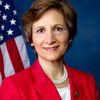Scott Phillips (Oregon)
Scott Phillips (Democratic Party) ran for election to the U.S. House to represent Oregon's 1st Congressional District. He lost in the Democratic primary on May 17, 2022.
Phillips completed Ballotpedia's Candidate Connection survey in 2022. Click here to read the survey answers.
Biography
Scott Phillips was born in Walla Walla, Washington. He earned a bachelor's degree from the University of Washington, Seattle in 1987 and a graduate degree from Georgetown University in 1997. His career experience includes working as a programmer and a volunteer with the U.S. Peace Corps.[1]
Elections
2022
See also: Oregon's 1st Congressional District election, 2022
General election
General election for U.S. House Oregon District 1
Incumbent Suzanne Bonamici defeated Chris Mann in the general election for U.S. House Oregon District 1 on November 8, 2022.
Candidate | % | Votes | ||
| ✔ |  | Suzanne Bonamici (D / Working Families Party) | 67.9 | 210,682 |
 | Chris Mann (R)  | 31.9 | 99,042 | |
| Other/Write-in votes | 0.2 | 519 | ||
| Total votes: 310,243 | ||||
 = candidate completed the Ballotpedia Candidate Connection survey. = candidate completed the Ballotpedia Candidate Connection survey. | ||||
| If you are a candidate and would like to tell readers and voters more about why they should vote for you, complete the Ballotpedia Candidate Connection Survey. | ||||
Do you want a spreadsheet of this type of data? Contact our sales team. | ||||
Withdrawn or disqualified candidates
- Nicholas Rascon (Independent)
Democratic primary election
Democratic primary for U.S. House Oregon District 1
Incumbent Suzanne Bonamici defeated Scott Phillips and Christian Robertson in the Democratic primary for U.S. House Oregon District 1 on May 17, 2022.
Candidate | % | Votes | ||
| ✔ |  | Suzanne Bonamici | 88.2 | 80,317 |
 | Scott Phillips  | 8.6 | 7,832 | |
| Christian Robertson | 2.9 | 2,625 | ||
| Other/Write-in votes | 0.3 | 287 | ||
| Total votes: 91,061 | ||||
 = candidate completed the Ballotpedia Candidate Connection survey. = candidate completed the Ballotpedia Candidate Connection survey. | ||||
| If you are a candidate and would like to tell readers and voters more about why they should vote for you, complete the Ballotpedia Candidate Connection Survey. | ||||
Do you want a spreadsheet of this type of data? Contact our sales team. | ||||
Republican primary election
Republican primary for U.S. House Oregon District 1
Chris Mann defeated Army Murray in the Republican primary for U.S. House Oregon District 1 on May 17, 2022.
Candidate | % | Votes | ||
| ✔ |  | Chris Mann  | 66.9 | 19,605 |
| Army Murray | 30.9 | 9,047 | ||
| Other/Write-in votes | 2.3 | 671 | ||
| Total votes: 29,323 | ||||
 = candidate completed the Ballotpedia Candidate Connection survey. = candidate completed the Ballotpedia Candidate Connection survey. | ||||
| If you are a candidate and would like to tell readers and voters more about why they should vote for you, complete the Ballotpedia Candidate Connection Survey. | ||||
Do you want a spreadsheet of this type of data? Contact our sales team. | ||||
Withdrawn or disqualified candidates
- David Russ (R)
Campaign themes
2022
Ballotpedia survey responses
See also: Ballotpedia's Candidate Connection
Scott Phillips completed Ballotpedia's Candidate Connection survey in 2022. The survey questions appear in bold and are followed by Phillips' responses.
| Collapse all
My life experiences are broad and diverse from poor to middle class, urban to rural, local to global. I have worked in large organizations. I know how to detect issues and dysfunction in practical terms. I’ve been a change agent from dorm halls to African villages to the halls of Fortune 500 companies. I’m a husband and I’m a father of two teenagers.
I’m running because I want to leave a better future for my children and I believe we are running out of time to solve our biggest challenges in a world getting more dangerous by the day. We need to rebuild everything from global supply chains to our own domestic institutions to our entire energy infrastructure. We need real structural change and innovation and less ideology and polarization.- Theme #1: New Frontier Future. America’s past prosperity has largely been based on our ability to lead the world on the frontiers of science, technology, and innovation. Today, it is critical for America to make bold bets on that next wave of high-paying jobs of the future from AI to Blockchain, Semiconductors to Space. But we also need to share the benefits of innovation more broadly from rural America’s farming communities to rebuilding blue-collar manufacturing to produce more goods using the advanced manufacturing of the future. The digital economy is not enough. We need a bolder New Frontier Future that is fair and creates opportunities for all.
- Theme #2: Grow the Democratic Party. To protect our democracy, we need to broaden our coalition and win back people who were once Democrats. Rural America was heavily Democrat. They largely left. We need them back. Blue-collar America was once reliably Democrat. They are leaving. We need them back. Hispanics may split evenly between both parties by 2024. To win back former Democrats, we need to get back to basics on affordability, crime, education, and homelessness. We need to solve problems and fix our cities. We need to listen better and blame less. We need new ideas in Congress that offer a bolder, more prosperous American future for all.
- Theme #3: 500 Miles. I’ve walked over 400 miles in the neighborhoods I hope to represent from Portland to Astoria. The incumbent has the money, I have shoe leather. I have seen who is doing well and who isn’t at a porch-to-porch level. Most people I meet are focused on the basics. Affordable housing. Accountability. Ending homelessness. Public safety. Cost of living. This is old-school social media: Pavement politics. Hundreds of conversations have helped focus me on key issues. Overall, I believe we need structural change and innovation to make progress on our biggest challenges and that message seems to resonate. If I had to do it again, I would do 500 miles and then 500 more. Cue the Proclaimers' “I’m Gonna Be (500 miles).
Jobs of the Future - Create and spread the high-paying jobs of the future from AI to Blockchain, Semiconductors to Space.
Climate Change - Transform carbon villains into carbon heroes with a pathway to better jobs in a carbon-free future.
Homelessness - End homelessness in America in two years with transitional college-style dorms that are safe, secure, and caring.
Rural America - Rebuild prosperous rural communities and small family farms across America.
Manufacturing - Recapitalize American manufacturing and reinvent unions for the advanced manufacturing of the future.
Poverty Reduction - Cut urban poverty by 50% in 5 years with both short and long-term approaches.
Against this very grim set of fundamental challenges, we have an opportunity to reinvent the future, rebuild our domestic institutions, re-energize our democracy, and create a more prosperous American Dream for all by creating a New Frontier Future to rebuild urban and rural America, seize the frontier of space, and create a more just economy at home.
Vladimir Putin is Exhibit A for why we have the system we do. He doesn’t have that check and balance on his power that our Congress provides in America. And look at the stupid foolishness he has committed and the lengths of repression that he is going to against his own people while piously talking about defending traditional values. Vladimir Putin is exactly the reason we have a two-year term and a robust system of checks and balances.
Note: Ballotpedia reserves the right to edit Candidate Connection survey responses. Any edits made by Ballotpedia will be clearly marked with [brackets] for the public. If the candidate disagrees with an edit, he or she may request the full removal of the survey response from Ballotpedia.org. Ballotpedia does not edit or correct typographical errors unless the candidate's campaign requests it.
See also
2022 Elections
External links
Footnotes
- ↑ Information submitted to Ballotpedia through the Candidate Connection survey on April 16, 2022









